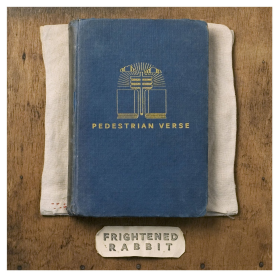By Michael Scoular (The Cascade) – Email
Print Edition: February 27, 2013
 Most Frightened Rabbit songs give off a self-contradictory tone, internally but also as received, sounding needlessly morose to those with a positive outlook, but containing enough weary lyricism to allow for words like “hopeful” or “optimistic,” always bordered by numerous qualifiers, to be used in the same breath.
Most Frightened Rabbit songs give off a self-contradictory tone, internally but also as received, sounding needlessly morose to those with a positive outlook, but containing enough weary lyricism to allow for words like “hopeful” or “optimistic,” always bordered by numerous qualifiers, to be used in the same breath.
Pedestrian Verse for most of its selection does not differ from the standard set down by Frightened Rabbit’s three previous albums; Scott Hutchison’s thin, accented cross between a cry and a perpetual question set comfortably in front of strums and cymbal smashes, while a little variation in chosen metaphor differentiates the dozen or so documents of comedowns and disappointments. This consistency could say that this is a rut, a fulfillment of expectations, a groove of complacency where calling out problems as the way things are and setting them to a relatively popular line is the end point (until the next repetition).
The usual counter is that this approach is more realistic. But Hutchison’s songwriting more often than not already strays into fantastical explanations of this condition – if anything this isn’t reality but a picture informed by, as detailed in “Nitrous Gas,” the indulgence of “sweet self-loathing.” “I’m dying to bring you down with me,” he continues, which comes as both an acknowledgment of the lack of forward movement that led many to call previous record The Winter of Mixed Drinks a step sideways, and a positive criticism, that while still not the forefront of what Frightened Rabbit does, something that does show itself in new ways on Pedestrian Verse.
Revealing last year’s State Hospital EP to be nothing better than outtakes, lacking the connective tissue to fit into this release or cohere as a mini album, sounding like more of the same where the best of this album comes close to breaking the widespread image of the group, Pedestrian Verse has a structure that most resembles, at least superficially, previous high The Midnight Organ Fight. Broken up by two renditions of single minute song “Housing,” relationships recalled slip into generous amounts of downcast reflection before “Housing (Out)” and its rejection of “looking back has lost its point/so stare forward” spurs a final movement striving for an end to always calling for, crawling back to, the end.
Album opener “Acts of Man” sets a different kind of precedent, picking apart patriarchy from the inside out, cataloguing the process of power from parties to pressures to abuse to parenthood, before the bridge sees Hutchison admitting “I have never wanted more to give than/build a house around you/I am just like all the rest of them/sorry selfish trying to improve.” What Frightened Rabbit grounds itself in is often the drift from a briefly considered centre, where self-criticism undoes wrong but never establishes a point to move toward, and on Pedestrian Verse, even with the shift that comes with the last set, most of the album comes across as a near to failing attempt at self-diagnosis.
In terms of how this all sounds, another reason “Acts of Man” stands out is in its use of distortion, overwhelming all instruments as the song ends, which is a long way from how Frightened Rabbit played two albums ago. Following up, second song “Backyard Skulls” opens with an organ key and synth scales – the whole album is inclined more to forceful application, rather than the space between lines that defined some of the band’s prior work. Hutchison’s way with words has always been literal-minded, with clear connections between meaning and saying, and this only furthers that.
“The Oil Slick” is another, where self-doubt rises in words describing “the shit I write” and the fruitlessness of “[talking] like I’m warmth,” and is echoed in a pitch-shifted cacophonous first chorus. But since this comes in the final stretch of the album, that isn’t where it ends. Continuing from the unexpected use of added instrumentation at the album’s start, major choruses are added to Hutchison’s voice. Builds that come to resemble rock—maybe even pop—anthemic finishes make quieter, less sure beginnings something in the distance, rather than the present.
The loudest of these is the last track “Escape Route,” which after the attempts at empathy (or just self-pity) (“If You Were Me”) and restitution (“Snow Still Melting”) preceding, looks out, states generally, moves apart from the tendency of the genre to simply state “This is how I feel” and leave it there, and into the territory of how another does, is going to, through “the notes of a song,” “in cinematic space,” in the realm of feeling informing action (the song, like The Midnight Organ Fight’s closer, is about the saving of a suicide), and the way words fall into, contain, and anticipate redefinitions.

